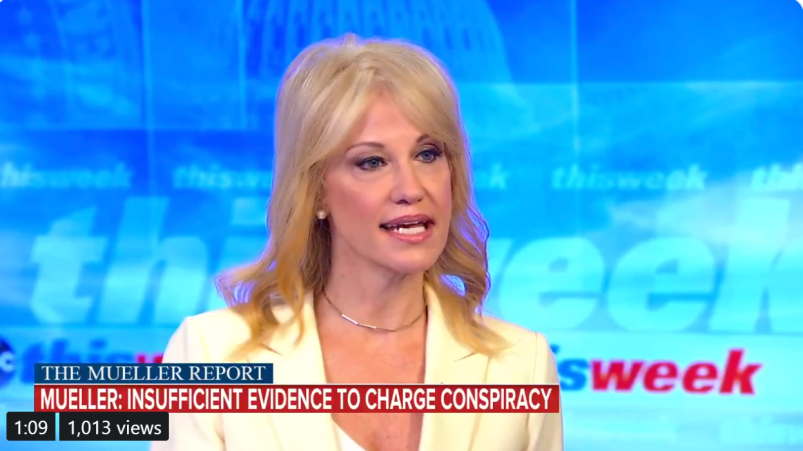Two key surrogates for President Donald Trump on Sunday sought to discredit a Republican lawyer who served in the White House until six months ago: Don McGahn, the former White House counsel who, per a New York Times tally, was cited more than anyone else in special counsel Robert Mueller’s redacted final report.
Specifically, Trump lawyer Rudy Giuliani and White House adviser Kellyanne Conway sought to muddy the waters regarding reports addressed by Mueller’s team that Trump told McGahn to have the Justice Department remove Mueller, and that McGahn decided he would sooner resign than do so. Mueller detailed Trump’s efforts to have McGahn deny the press reports, which McGahn refused to do because, in the report’s words, “they were accurate in reporting on the President’s effort to have the Special Counsel removed.”
The back-and-forth — both the initial alleged pressure on McGahn to have Mueller removed, and the pressure on him to deny reports about that initial pressure — is seen by many as a key piece of evidence that Trump sought to obstruct justice, a charge Mueller did not consider because of an existing Justice Department Office of Legal Counsel memo that a sitting president can no be the subject of prosecution.
By Sunday morning, when Giuliani addressed that section of the Mueller report, he’d already asserted to The New York Times that it was inaccurate, to which McGahn’s lawyer said it was in fact “accurately described.”
“I would ask, which of the three versions is McGahn standing by?” Giuliani told CNN’s Jake Tapper in response to McGahn’s lawyer’s statement, before listing several versions of the story.
While it’s true McGahn, per the report, used slightly different language at various points to describe the initial conversations Trump had with him, Giuliani also put words in McGahn’s mouth during the CNN interview.
For example, while The New York Times used the word “fire” in its January 2018 report on the initial conversations between Trump and McGahn, McGahn himself did not use that word in interviews with Mueller’s team. Yet, Giuliani implied to Tapper that McGahn had used the word, citing the page number of Mueller’s report on which the New York Times article is described and saying: “The first version that he says is, ‘The President told me to fire him because he’s upset about conflicts of interest, and I told him I’d resign.'”
But there’s no such quote credited to McGahn in the redacted Mueller report.
In fact, the special counsel’s redacted report noted: “McGahn spoke with the President twice and understood the directive the same way both times, making it unlikely that he misheard or misinterpreted the President’s request.”
McGahn asserted in interviews with Mueller’s team that Trump directed him twice over the phone to have Mueller removed. In the report’s words:
On the first call, McGahn recalled that the President said something like, “You gotta do this. You gotta call Rod.” […]
When the President called McGahn a second time to follow up on the order to call the Department of Justice, McGahn recalled that the President was more direct, saying something like, “Call Rod, tell Rod that Mueller has conflicts and can’t be the Special Counsel.” […]
In a separate interview on “Fox News Sunday,” Giuliani made an additional argument: “If he had fired him, there wouldn’t have been an obstruction so long as he was replaced by somebody, which he would have been.”
Conway, on ABC’s “This Week” Sunday, also would not grant that Trump had asked McGahn to get the DOJ to remove Mueller. She further implied that the very fact McGahn didn’t resign at the time undermined his testimony.
“I believe that Don McGahn is an honorable attorney who stayed on the job 18 months after this alleged incident took place, and that if he were being asked to obstruct justice or violate the Constitution, or commit a crime, help to commit a crime by the President of the United States, he wouldn’t have stayed,” Conway said. “I certainly wouldn’t stay.”
In fact, per the Mueller report, McGahn stayed on the job after the initial pressure from Trump because “[Reince] Priebus and [Steve] Bannon both urged McGahn not to quit” and because, after he refused Trump’s initial attempts to have have him convince the DOJ to fire Mueller, “the President did not ask McGahn whether he had followed through with calling Rosenstein.”
Later, after McGahn refused to contradict press reports about the pressure to have Mueller removed, “the President’s personal counsel called McGahn’s counsel and relayed that the President was ‘fine’ with McGahn,” the report said.
.@MarthaRaddatz: "Do you believe Don McGahn when he says the president tried to get him to fire Bob Mueller?"
Kellyanne Conway: "I believe the president was frustrated about the investigation from the very beginning and knew it was ill-conceived" https://t.co/yZdNkbTlSI pic.twitter.com/1TDuyRsia6
— This Week (@ThisWeekABC) April 21, 2019



